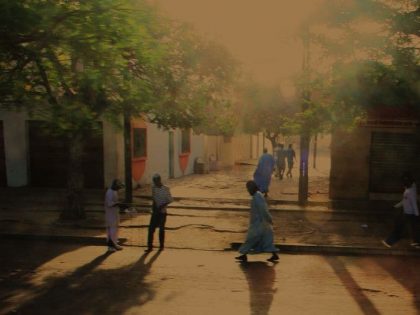Eight hours in Addis
A reflection by Kenyan writer, Norbert Odero, on a short visa-free visit to Ethiopia.

Image supplied by author.
There are blue and yellow taxis at Bole International Airport in Addis Ababa. Taxi color is a code for age. Blue taxis are old cars. Three decades old. Sometimes more. Yellow taxis are a bit newish. Not posh, luxurious taxis. Just new.
Bole International Airport is fascinating chorus of organized chaos. A line of passengers form somehow within this chaos. A uniformed airport worker pulls every African looking person aside. Asks if any of us has visited the Congo in the recent past. He says something about Ebola and looks relieved that none of us has visited the Congo. Another one follows closely enquiring about our visas. I don’t have one. I pull out my Kenyan passport and hand it over to him. Then it happens. The man lights up. I have come to learn that any smile in an airport when one bears an African passport is always a good thing. It signals a promise of African brotherhood, to fill any gaps an African passport may be too weak to fill. Then it happens. I am pushed to the head of the line. First time ever, I am receiving privileged treatment based on my Kenyan passport. I quickly learn that Ethiopia has special relationship with Kenya and Eritrea. We, Kenyans, do not need any form of visa to visit Ethiopia. We just show up. And get special treatment too. My mind is blown. Kenya is a home to many Ethiopian immigrants. And in most instances, Kenya has assimilated foreigners successfully without discrimination. This is one of the reason why Nairobi is a melting pot of African culture and those of other foreign nations, floating in the rich spirit of Ubuntu. But this special treatment must be in appreciation of something Kenya and Ethiopia did to each other many years ago. Something special probably between President Jomo Kenyatta and Emperor Haile Selassie. Or before. Something about pre-independence Pan-African brotherhood. Haile Selassie Avenue in the heart of Nairobi permanently sealed this brotherhood in our national psyche.
A few months before this trip, I arrived at Jomo Kenyatta National Airport, Kenya from Dakar, Senegal. The flight arrived at dawn. JKIA was alive nonetheless. I was walking in the midst of Africans and white foreigners when I arrived at some random check point mounted by the airport health team. They were looking for yellow fever certificates. Almost frantically. There was only one problem. Only Africans were being pulled aside for questioning about yellow fever vaccination certificates. I protested loudly at this glaring discrimination. This logic that decreed that only African looking people are thought to carry disproportionate risk of spreading infectious diseases. This disease and health politics so entrenched in international development. I protested in Swahili and received muted apologies. “Sorry, we thought you were West African. Or Nigerian.” This is why I take this special treatment at Bole International Airport seriously. It is rare, a good sign of things to come as African nations open their borders to each other. Kenya and South Africa have opened their borders to each other. East Africa to all East Africans. ECOWAS to their member nations.
Back in Addis, a taxi pulls up and I negotiate with Aaron, the taxi driver to guide me around the city. One of the attractions is the prime minister’s residence. We drive up the hill.
“The new prime minister is a good man,” Aaron says between shifting gears. How? I ask.
“Because if you have something disturbing you in your chest, you say it freely and you do not go to jail.” He says. Freedom of speech. Ethiopian governments have had a dubious distinction for jailing journalists for speaking, for writing anything the regime does not like.
What of growth? I ask as we pass upcoming construction for hotels by the Hyatt and Marriot groups and other American brands. Things are getting better. Aaron says. But again, with people importing cheap twenty-five year old cars from junk yards in Dubai, it is hard to tell if enough money is circulating in this economy.
It is now 6 o’clock in the morning. Men and women are jogging up and down the well paved road leading to prime minister’s residence. Then I see it. The imposing building hidden behind high fences and paramilitary watch. I point at it excitedly. Aaron looks alarmed. He tells me to put my hands down.
“We get into trouble if soldiers see us.” He says. You just said things are different now. I tell remind him. I am confused. And become more aware of the camera on my lap.
Now, this country, proud and uncolonized, should do better than this. Ethiopia was indeed meant to be a great African experiment. Something we, Africans, could refer to when looking straight at the eyes of the British and say, “You see how great Ethiopia is doing?” “Yes, this is how well we would be without you.” After all, we all know royal blood from ancient union of King Solomon and the Queen of Sheba flows freely here. But alas, wars, famine and strong men like President Meles Zenawi showed up and Ethiopia got stuck in this space, like a black and white photo of a poor family looking into the future, with an uncertain smile, and a lot of hope. There is always hope.
If only the new prime minister can build the national consciousness around peace and democracy, this nation can thrive. Or maybe not. Who knows? What is for sure, is that there is always a ghost of former strongmen shaping the fears of the new men and women in power.






